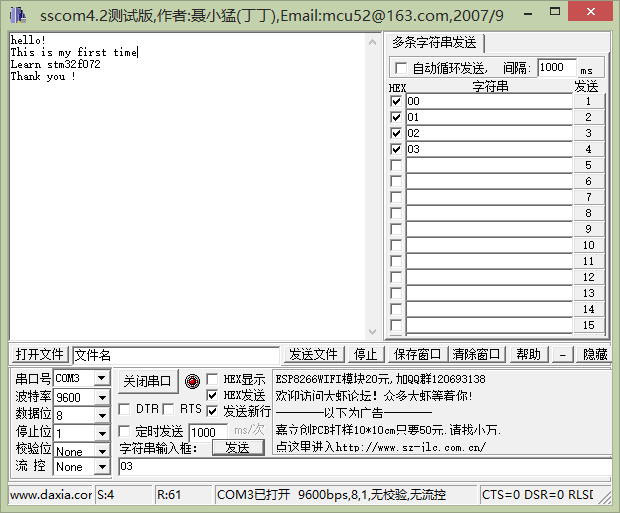基于mdk的开发平台 今天初步学习了串口模块,于是就写了一简单的接受显示程序。主程序如下- /**
- ******************************************************************************
- * File Name : main.c
- * Date : 13/12/2014 10:10:53
- * Description : Main program body
- ******************************************************************************
- *
- * COPYRIGHT(c) 2014 STMicroelectronics
- *
- * Redistribution and use in source and binary forms, with or without modification,
- * are permitted provided that the following conditions are met:
- * 1. Redistributions of source code must retain the above copyright notice,
- * this list of conditions and the following disclaimer.
- * 2. Redistributions in binary form must reproduce the above copyright notice,
- * this list of conditions and the following disclaimer in the documentation
- * and/or other materials provided with the distribution.
- * 3. Neither the name of STMicroelectronics nor the names of its contributors
- * may be used to endorse or promote products derived from this software
- * without specific prior written permission.
- *
- * THIS SOFTWARE IS PROVIDED BY THE COPYRIGHT HOLDERS AND CONTRIBUTORS "AS IS"
- * AND ANY EXPRESS OR IMPLIED WARRANTIES, INCLUDING, BUT NOT LIMITED TO, THE
- * IMPLIED WARRANTIES OF MERCHANTABILITY AND FITNESS FOR A PARTICULAR PURPOSE ARE
- * DISCLAIMED. IN NO EVENT SHALL THE COPYRIGHT HOLDER OR CONTRIBUTORS BE LIABLE
- * FOR ANY DIRECT, INDIRECT, INCIDENTAL, SPECIAL, EXEMPLARY, OR CONSEQUENTIAL
- * DAMAGES (INCLUDING, BUT NOT LIMITED TO, PROCUREMENT OF SUBSTITUTE GOODS OR
- * SERVICES; LOSS OF USE, DATA, OR PROFITS; OR BUSINESS INTERRUPTION) HOWEVER
- * CAUSED AND ON ANY THEORY OF LIABILITY, WHETHER IN CONTRACT, STRICT LIABILITY,
- * OR TORT (INCLUDING NEGLIGENCE OR OTHERWISE) ARISING IN ANY WAY OUT OF THE USE
- * OF THIS SOFTWARE, EVEN IF ADVISED OF THE POSSIBILITY OF SUCH DAMAGE.
- *
- ******************************************************************************
- */
- /* Includes ------------------------------------------------------------------*/
- #include "stm32f0xx_hal.h"
- /* USER CODE BEGIN Includes */
- /* USER CODE END Includes */
- /* Private variables ---------------------------------------------------------*/
- UART_HandleTypeDef huart2;
- /* USER CODE BEGIN PV */
- /* USER CODE END PV */
- /* Private function prototypes -----------------------------------------------*/
- void SystemClock_Config(void);
- //void putchar(uchar);
- static void MX_GPIO_Init(void);
- static void MX_USART2_UART_Init(void);
- #define uchar unsigned char
- #define uint unsigned int
- void delay(uint x)
- {
- int z,y;
- for(z=0;z<x;z++)
- for(y=0;y<5000;y++);
- }
- /* USER CODE BEGIN PFP */
- /* USER CODE END PFP */
- /* USER CODE BEGIN 0 */
- /* USER CODE END 0 */
- void putchar(uchar data)
- {
- while(!(USART2->ISR&(1<<7)));
- USART2->TDR=data;
- }
- void puts(uchar *p)
- {
- while(*p!=0)
- {
- putchar(*p);
- p++;
- }
- putchar(0X0D);
- putchar(0X0A);
- }
- uchar getchar(void)
- {
- uchar data;
- while(!(USART2->ISR&(1<<5)));
- data=USART2->RDR;
- return data;
- }
- int main(void)
- {
- /* Reset of all peripherals, Initializes the Flash interface and the Systick. */
- HAL_Init();
- /* Configure the system clock */
- SystemClock_Config();
- /* Initialize all configured peripherals */
- MX_GPIO_Init();
- MX_USART2_UART_Init();
- while (1)
- {
- switch(getchar())
- {
- case 0x00:puts("hello!");
- break;
- case 0x01:puts("This is my first time");
- break;
- case 0x02:puts("Learn stm32f072");
- break;
- default:puts("Thank you !");
- break;
- }
- }
- }
- /** System Clock Configuration
- */
- void SystemClock_Config(void)
- {
- RCC_OscInitTypeDef RCC_OscInitStruct;
- RCC_ClkInitTypeDef RCC_ClkInitStruct;
- RCC_PeriphCLKInitTypeDef PeriphClkInit;
- RCC_OscInitStruct.OscillatorType = RCC_OSCILLATORTYPE_HSI;
- RCC_OscInitStruct.HSIState = RCC_HSI_ON;
- RCC_OscInitStruct.HSICalibrationValue = 16;
- RCC_OscInitStruct.PLL.PLLState = RCC_PLL_ON;
- RCC_OscInitStruct.PLL.PLLSource = RCC_PLLSOURCE_HSI;
- RCC_OscInitStruct.PLL.PLLMUL = RCC_PLL_MUL12;
- RCC_OscInitStruct.PLL.PREDIV = RCC_PREDIV_DIV2;
- HAL_RCC_OscConfig(&RCC_OscInitStruct);
- RCC_ClkInitStruct.ClockType = RCC_CLOCKTYPE_SYSCLK;
- RCC_ClkInitStruct.SYSCLKSource = RCC_SYSCLKSOURCE_PLLCLK;
- RCC_ClkInitStruct.AHBCLKDivider = RCC_SYSCLK_DIV1;
- RCC_ClkInitStruct.APB1CLKDivider = RCC_HCLK_DIV1;
- HAL_RCC_ClockConfig(&RCC_ClkInitStruct, FLASH_LATENCY_1);
- PeriphClkInit.PeriphClockSelection = RCC_PERIPHCLK_USART2;
- PeriphClkInit.Usart2ClockSelection = RCC_USART2CLKSOURCE_PCLK1;
- HAL_RCCEx_PeriphCLKConfig(&PeriphClkInit);
- __SYSCFG_CLK_ENABLE();
- }
- /* USART2 init function */
- void MX_USART2_UART_Init(void)
- {
- huart2.Instance = USART2;
- huart2.Init.BaudRate = 9600;//²¨ÌØÂÊÉèÖÃΪ9600
- huart2.Init.WordLength = UART_WORDLENGTH_8B;
- huart2.Init.StopBits = UART_STOPBITS_1;
- huart2.Init.Parity = UART_PARITY_NONE;
- huart2.Init.Mode = UART_MODE_TX_RX;
- huart2.Init.HwFlowCtl = UART_HWCONTROL_NONE;
- huart2.Init.OverSampling = UART_OVERSAMPLING_16;
- huart2.Init.OneBitSampling = UART_ONEBIT_SAMPLING_DISABLED ;
- huart2.AdvancedInit.AdvFeatureInit = UART_ADVFEATURE_NO_INIT;
- HAL_UART_Init(&huart2);
- }
- /** Configure pins as
- * Analog
- * Input
- * Output
- * EVENT_OUT
- * EXTI
- */
- void MX_GPIO_Init(void)
- {
- GPIO_InitTypeDef GPIO_InitStruct;
- /* GPIO Ports Clock Enable */
- __GPIOC_CLK_ENABLE();
- __GPIOF_CLK_ENABLE();
- __GPIOA_CLK_ENABLE();
- /*Configure GPIO pin : PC13 */
- GPIO_InitStruct.Pin = GPIO_PIN_13;
- GPIO_InitStruct.Mode = GPIO_MODE_EVT_RISING;
- GPIO_InitStruct.Pull = GPIO_NOPULL;
- HAL_GPIO_Init(GPIOC, &GPIO_InitStruct);
- /*Configure GPIO pin : PA5 */
- GPIO_InitStruct.Pin = GPIO_PIN_5;
- GPIO_InitStruct.Mode = GPIO_MODE_OUTPUT_PP;
- GPIO_InitStruct.Pull = GPIO_NOPULL;
- GPIO_InitStruct.Speed = GPIO_SPEED_LOW;
- HAL_GPIO_Init(GPIOA, &GPIO_InitStruct);
- }
- /* USER CODE BEGIN 4 */
- /* USER CODE END 4 */
- #ifdef USE_FULL_ASSERT
- /**
- * @brief Reports the name of the source file and the source line number
- * where the assert_param error has occurred.
- * @param file: pointer to the source file name
- * @param line: assert_param error line source number
- * @retval None
- */
- void assert_failed(uint8_t* file, uint32_t line)
- {
- /* USER CODE BEGIN 6 */
- /* User can add his own implementation to report the file name and line number,
- ex: printf("Wrong parameters value: file %s on line %d\r\n", file, line) */
- /* USER CODE END 6 */
- }
- #endif
- /**
- * @}
- */
- /**
- * @}
- */
- /************************ (C) COPYRIGHT STMicroelectronics *****END OF FILE****/

以后在方案开发中准备用串口去调试 |


 微信公众号
微信公众号
 手机版
手机版

谢谢啊
cube建立的工程 后来就没用他的库函数,一直操作的是寄存器。寄存器比较的简单,所以你懂的。。。。
还没用过cube呢,我也喜欢寄存器
寄存器模式 简单 明了 而又直观
感谢评论